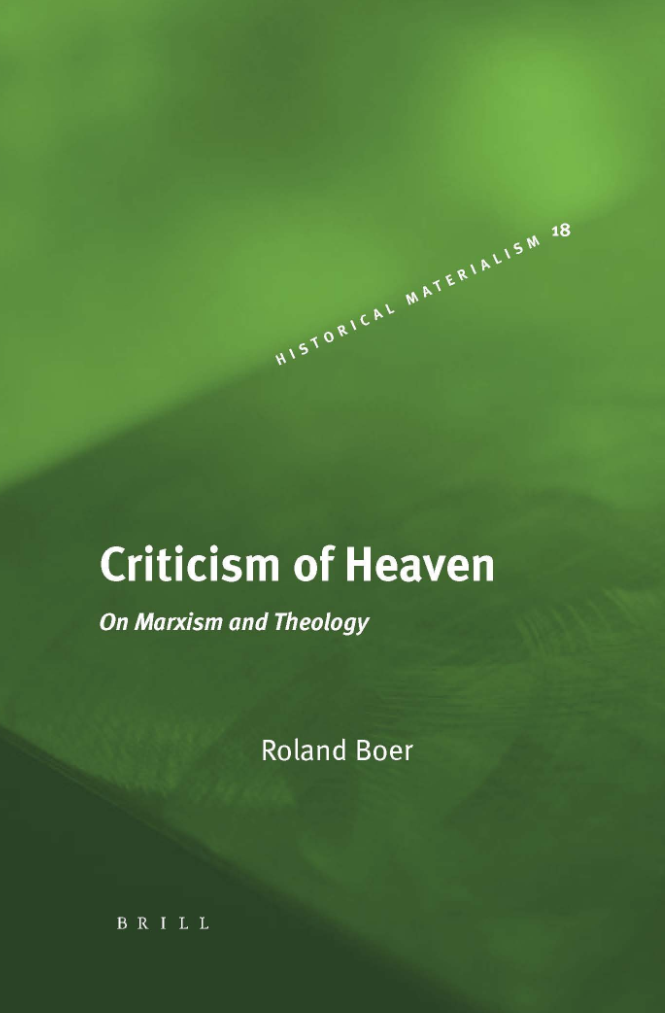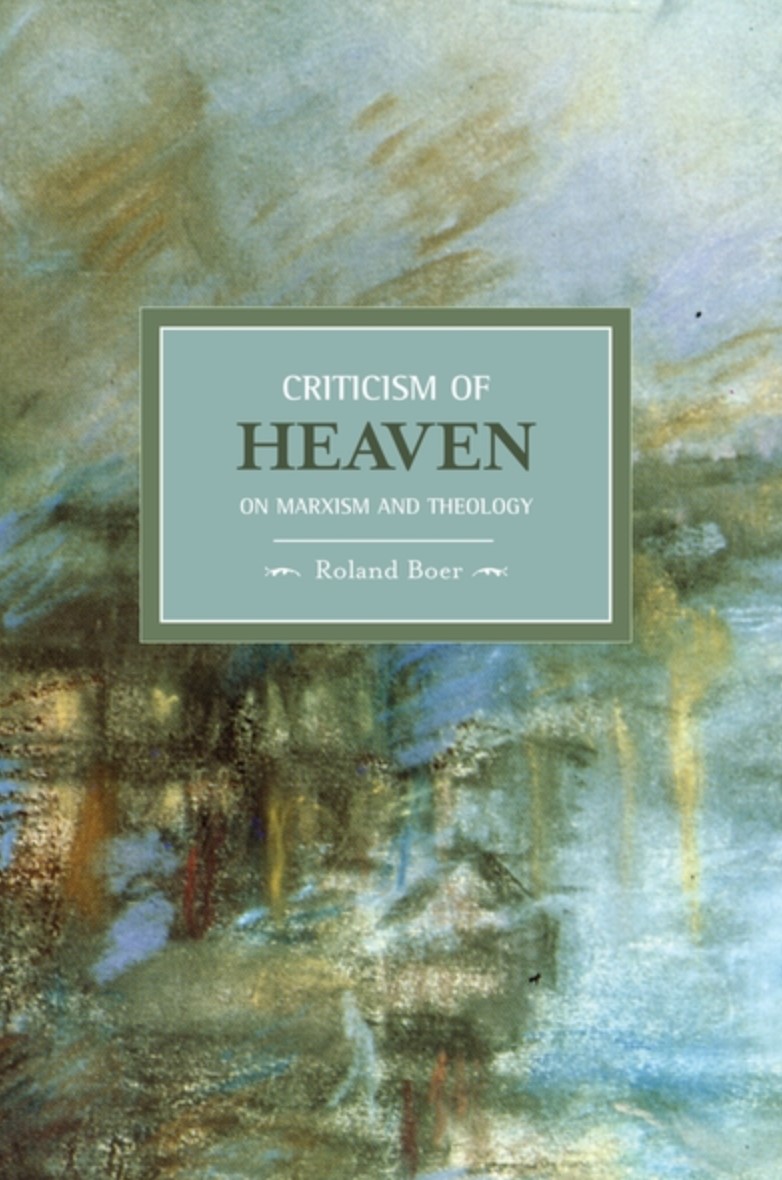Roland Boer, Monash University, Melbourne
This volume consists of a critical commentary on the interactions between Marxism and theology in the work of the major figures of Western Marxism. It deals with the theological writings of Ernst Bloch, Walter Benjamin, Louis Althusser, Henri Lefebvre, Antonio Gramsci, Terry Eagleton, Slavoj Žižek and Theodor Adorno. In many cases their theological writings are dealt with for the first time in this book. It is surprising how much theological material there is and how little commentators have dealt with it. Apart from the critical engagement with the way they use theology, the book also explores how their theological writings infiltrate and enrich their Marxist work. The book has three parts: Biblical Marxists (Bloch and Benjamin), Catholic Marxists (Althusser, Lefebvre, Gramsci and Eagleton), and the Protestant Turn (Žižek and Adorno).
Biographical note
Readership
Reviews
Matthew Sharpe, Arena Journal, No. 41/42, 2013: [28]-58.”The tradition of the Marxist reference and critical appropriation of Christian legacy is a long one, starting with the Late Friedrich Engels. Through the XXth century, it left its mark on some of the greatest Marxist figures, from Gramsci to Benjamin, and it was given a new boost in the last years by Agamben and Badiou. Boer’s book, the first one to give a detailed overview of this entire tradition, is much more than a mere critical compendium. One usually says about introductions and overviews that they succeed if they bring the reader to take a look at the original texts themselves. Criticism of Heaven stands fully on its own, achieving a perfect balance between a detailed exegesis and the deployment of the interpreter’s own position. In an almost miraculous way, the more we understand the interpreted authors, the more we hear Boer’s own voice. An indispensable volume not only for those interested in the topic, but for all who strive for a cognitive mapping of today’s perplexing state of things.
(Slavoj Žižek, Birkbeck College, London)
“In his highly intriguing and relevant work, Roland Boer, esteemed and prolific biblical scholar, offers a traveller’s guide to European Neo- Marxist positions from the point of view of their various biblical and theological bearings. Roland Boer’s brilliant exposition and highly controversial interpretations suggest that Marxism is the last resort of a bona fide Calvinist theology of grace.
(Carsten Pallesen, Professor of Theology, University of Copenhagen)
Praise for Marxist Criticism of the Bible
“An astonishing tour de force in which the varieties of Marxist criticism are marshalled to investigate the extraordinary richness in both form and content of the Hebrew Bible. It is a lesson in dialectical criticism fully as much as in Biblical Studies.”
(Fredric Jameson, Duke University)
“All […] of these essays are well worth reading. They embody the fruit of many years of reflection and show a most impressive command of a vast and heterogeneous literature. They are insightful, thought-provoking, and also original in the sense of revealing unexpected aspects of those under discussion. The style is sometimes a little arch, but the analysis is always substantial and the assessment judicious. No one reading Boer will come away without being better informed and wiser.”
David McLellan, Marx and Philosophy Review of Books. Accessed 2 September 2010
URL: http://www.marxandphilosophy.org.uk/reviewofbooks/reviews/2010/182
Table of contents
Introduction1. Bloch’s Detective Work
Argument and advocacy
From the Bible to sentence production, and back again
Method: class conflict as a hermeneutical key
Vagaries of writing
Oral and written texts
Forces of redaction
Biblical criticism
The politics of interpretation
The critique of myth
Exegesis
The Hebrew Bible
New Testament
The return to theology
Atheism
Teleology
Transcendence
Faith, hope, sin and death
2. Benjamin’s Perpetuation of Biblical Myth
Trauerspiel
Demons, allegory and flesh (allegorical level)
Fall and Eschaton (moral and anagogic levels)
Passagenarbeit
Method: collector as allegorist
Passages
The double allegory of Marxism and theology
Myth and history
Appropriation of the maternal function
Genesis
Language
Ursprung
Salvation history [Heilsgeschichte]: the return of biblical myth
Conclusion
3. The Ecclesiastical Eloquence of Louis Althusser
Ecclesiastical form: theological writings
From absent cause to philosophy of religion
The logical necessity
Elements of a materialist philosophy of religion
Ideology
Myth
Conclusion: the terminus of (auto)biography?
4. The Heresies of Henri Lefebvre
Threshold
Exploration
Worship
Archaeology
Heresies
Blondel
Joachim de Fiore and mysticism
Jansen and the Albigensians
The Devil
On religion: reading Lefebvre against himself
Everyday life
Space
Women
Conclusion
5. The Ecumenism of Antonio Gramsci
Ecumenism
Politics: the ‘Eighteenth Brumaire’ of the Holy See
Catholic Action
Internal conflict: integralists, Jesuits and modernists
Bewilderment? External alliances
Intellectuals
Reformation
Counter-Reformation and Reformation
The Italian Luther
Conclusion
6. The Apostasy of Terry Eagleton
Wit and the encyclopaedia, or the tensions of style
Orthodoxy and orthopraxis
Asceticism
Evil and the humble virtues
The absence of sin, or, the politics of forgiveness
Radical christology
Theology redidivus?
The desire for a historical Jesus
Christological metaphors
The problem of the personality cult
An intrinsic Eagleton? (The question of ecclesiology)
7. The Conversion of Slavoj Žižek
The darkness of Lacan: the challenge of Butler and Laclau
Of truth-events and sundry matters: the challenge of Badiou
Materialist grace?
A glimpse
The cul-de-sac of ethics and love
The Protestant turn
Badiou, or militant gratuitousness
The grace of V. I. Lenin
Kierkegaard’s snare
Revolutionary grace
Conclusion
8. Adorno’s Vacillation
Theological suspicion
Demythologisation
Faith: inwardness and history
Christology
Sacrifice
Cosmology: the spheres
Secularised theology
Judaism and the ban on images
The possibilities of theology
Love
Grace
Conclusion
Conclusion
References
Index


